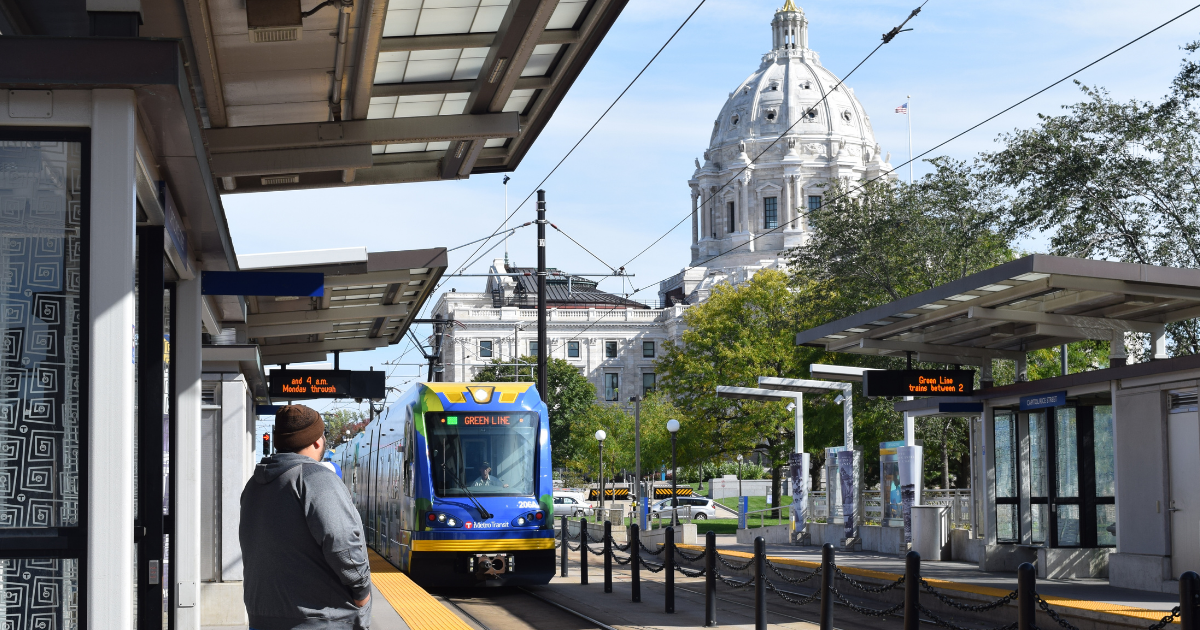Bipartisan Legislators Should Go All the Way in Decriminalizing Fare Evasion
Move Minnesota and allies are fighting to change state fare enforcement policy that forces heavy fines and criminal penalties on people who are unable to pay for transit fare. Bills advancing at the State Capitol include important steps in the right direction, but don’t go far enough.
Earlier this week, MinnPost published a commentary piece by Move Minnesota’s Community Organizer, Finn McGarrity, highlighting the urgent need to add decriminalization to this bipartisan legislation. Reposted below, the commentary was written in partnership and is co-signed by Julia Decker at the ACLU of Minnesota, Ricardo Perez at The Alliance and Blue Line Coalition, Madi Johnson at MN350, and Amity Foster at Twin Cities Transit Riders Union.
After the commentary, watch a short video to hear more from Finn on why the current fare enforcement policy is unjust and what needs to change to create a more consistent and equitable system. The clip is from Finn’s testimony at the fare enforcement bill hearing in the MN House earlier this session. A full transcript of the video is also provided.
FEATURED COMMENTARY
When Minnesotans ride transit without paying a fare, they can be punished with criminal penalties and hundreds of dollars in fines. It’s a heavy-handed approach that is dramatically different from the way parking tickets are enforced — and it needs to change.
Decriminalization is an essential piece of reform. Bills currently moving forward at the state Capitol would allow parking-ticket-style administrative citations for fare enforcement. They also create a transit agent program that assists with enforcement and connects riders to resources. These are important steps in the right direction; however, the current proposal ultimately fails to decriminalize fare nonpayment by leaving misdemeanors and arrests on the books.
The potential for two systems of justice
Without decriminalizing fare evasion, the House bill and Senate bill (HF 1306 and SF 1513) perplexingly create the potential for two systems of justice where one person could receive an administrative citation for not paying a fare and another — on the same train — could find themselves arrested and even prosecuted with a misdemeanor. While the Met Council has pledged that they would “opt-in” to only using administrative citations, the bills leave the door open for discrimination in enforcement. As the Senate bill states, Metro Transit Police would have discretion in how they implement enforcement: “A peace officer must issue an administrative citation pursuant to this section, a criminal citation, or a verbal or written warning for a violation … as deemed appropriate by the officer.”
There is reason to be concerned. Evidence from other states validate the possibility of discriminatory enforcement. New York has a similar approach to the proposed bill where officers have the ability to either make a fare-enforcement arrest or issue a civil citation. Local district attorneys in New York have actively encouraged civil citations and pledged to not prosecute. But while fare-enforcement arrests have significantly dropped in New York from 25,000 arrests a year in 2016 to 10,00 arrests in 2018, a dual system of enforcement has played out where some riders get civil citations and others are arrested. A 2018 report from the Marshall Project that analyzed New York Division of Criminal Justice Services data detailed glaring racial bias in fare enforcement, citing that while most riders are issued a civil offense, Black and Hispanic riders comprise 89% of arrests.
The need for a uniform policy
Metro Transit’s own 2015 data has shown racially biased enforcement of fare evasion, with Black and Native American adults 5-7 times more likely to be cited and arrested compared to their white peers. We need the guardrail of a uniform policy to ensure that these trends are not exacerbated. We also need reforms to overall enforcement that will reverse these trends and ensure that we are not simply replacing an unequal carceral system with an unequal financial system.
Across the country, more regions are pursuing a complete solution to the nonpayment of fares. In 2019 Washington, D.C., decriminalized fare evasion, and just this winter Republican Gov. Charlie Baker of Massachusetts signed legislation making it illegal to arrest transit riders for fare nonpayment.
Sen. Scott Newman, Transportation Finance and Policy Committee chair, said recently, “There’s really nothing wrong going from a criminal citation to a civil citation.” We agree with Newman, and we think he and his colleagues should amend their legislation to explicitly decriminalize fare evasion to ensure all riders are subject to the same law and not to the whim of an individual officer or a particular Met Council administration. At a time when law enforcement and our government institutions are working to restore the faith of the public and rebuild trust with communities of color, consistency and transparency are critical.
Lawmakers should amend the bills
Members of the Legislature and the Met Council have enough consensus to articulate that the current criminalization of fare evasion is unfair and punitive, and that the creation of a transit agent program to handle fare enforcement through administrative citations is appropriate. We believe their intentions are sincere. Let’s create a bill that reflects that. We urge lawmakers to amend these bills to include decriminalization to ensure all riders are treated equally and with dignity.
RELATED VIDEO
Video transcript
Representative Frank Hornstein: Several more testifiers . . . next up is Finn McGarrity from Move Minnesota. Welcome to the committee and please state your name for the record.
Finn McGarrity: Good afternoon, Chair Hornstein and committee members. My name is Finn McGarrity. I’m a community organizer with Move Minnesota. I’m a transit rider and I’m a resident of the Lyndale neighborhood in South Minneapolis. Move Minnesota is a local nonprofit that works to advance sustainable and equitable transportation through advocacy, education, and community engagement. Move Minnesota is working to ensure every community has choices for getting around. We are guided by a principle to create an equitable transportation system that puts people first. It is because of that principle of equity that while we appreciate and recognize the good faith efforts to implement transit representatives and to move towards an administrative citation system, we believe that this bill does not go far enough. By creating an administrative citation system without decriminalizing fare evasion, this bill perplexingly creates the potential for two systems of justice, where one rider could receive an administrative citation for non-payment affair and another rider could still find themselves with a misdemeanor.
In fact, we could not think of another example of a situation where the exact same action carries the potential for two wildly different consequences, depending on the whim of the enforcing party or agency. We believe that this bill leaves the door open for greater discrimination and enforcement. Metro Transit’s own data already disappointingly shows racially biased enforcement of fare evasion with Black and Native American adults, five to seven times more likely to be cited and arrested compared to their white peers. At a time when our government institutions and our law enforcement are working to restore the faith of the public and rebuild trust with communities of color, consistency and transparency are critical. Members of this committee and the Met Council agree as articulated in multiple bills, hearings, and public speaking events that the current criminalization of fare evasion is an unfair and punitive policy, and that a transit representative program to handle fare evasion through administrative citations is appropriate. We urge you to stand behind what you have said by passing a complete solution that will ensure all writers are treated equally and with dignity. Thank you.

